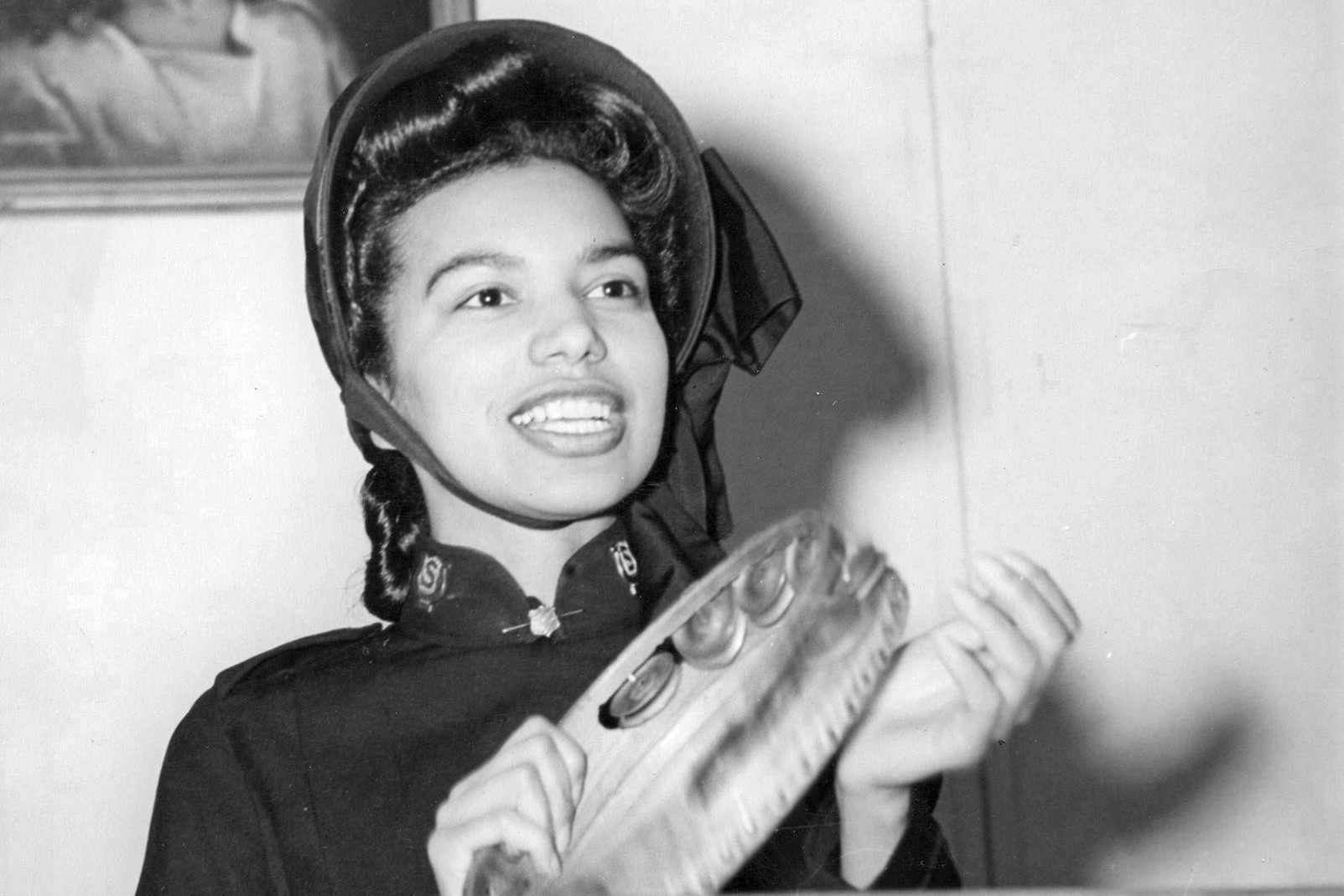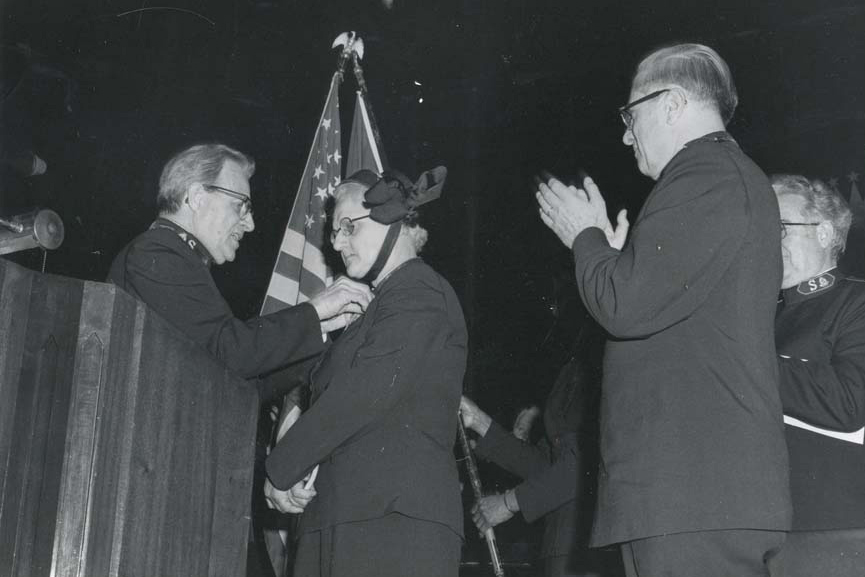Leading Ladies
Guest

by Rob Jeffery
Major Norma T. Roberts leads a congregation in worship, circa 1950s.
Women have played a vital role in ministry for The Salvation Army since its beginnings
To say that women have played a vital role in the history of the Church is the understatement of the millennia. But in the Western evangelical tradition of which The Salvation Army is part, women in many denominations are seemingly relegated to the sidelines of ministry. They are welcomed to serve, they are welcomed to teach children, they are welcomed to feed others—yet they are sadly unwelcomed in the pulpit. Thankfully in The Salvation Army this is not the case. Because of the influence of our Army Mother, Catherine Booth, we were among the first Christian denominations to commission and ordain women as ministers of the Gospel.
William Booth in 1908 wrote, “First and foremost I insist on woman’s equality. Every officer and soldier should hold to it that woman is as important, as valuable, as capable, and as necessary to the progress and happiness of the world as man.” Booth even goes so far as to say that any views contrary to that of full equality for women should be dismissed as “hideous and heathen notions.”
“To begin with,” he resumes, “the Army has maintained that the sexes are equal alike in birth; alike equal in the value of the soul and the capacity for joy and sorrow; alike equal before God and in the love of the Heavenly Father; alike equal in the responsibility for spreading salvation and extending the Kingdom of God.” For a man born in the early 19th century, who lived in an age when women had many doors closed to them, how wonderfully ahead of his times was William Booth?
With the doors wide open to them, women flooded the ranks of the early Salvation Army. Society took notice as these “Hallelujah Lassies” took up more space in the public sphere. One can imagine that they were vilified, objectified, and idealized all at once. But women found a place in The Salvation Army, taking on significant leadership roles. Author Diane Winston calls The Salvation Army “the first Christian group in modern times to treat women as men’s equals.”
With that proud legacy in mind, why does it sometimes seem that we don’t celebrate this as much as we should? Why does women’s ministry conjure up quaint notions of craft-making, or placing doilies on a table, rather than bold and fearless evangelism or a teaching ministry? Women’s ministry can certainly include traditional activities to draw people in, but let’s not be content to stop there. Women’s ministry can be advocating for the poor and marginalized in the community. It can mean working intensely to make conditions better for people whom the world often forgets. We thank God this is already happening in women-led ministries like PEARL Essence (Greater New York Division), which supports women caught up in human trafficking. What a difference they are making on the streets of New York!
Anglican scholar N.T. Wright frequently likes to use the metaphor of cathedral building in the medieval period to describe an individual Christian’s contribution to the Kingdom of God. In his description, the master stonemasons would be contracted to carve out the stones and build up the cathedral walls. Once the work was done, they would look up to see their stones in the walls of the church and take satisfaction in their contribution to it. Here are profiles of two Salvation Army women who spent their lifetime building up the Kingdom of God through their service to The Salvation Army. May we marvel at the contribution they made as we are inspired to go and do likewise.
Major Norma T. Roberts, Order of the Founder (b. 1922)
Norma Roberts felt the call of God on her life to become a Salvation Army officer in 1944. She applied to The Salvation Army Training School in the South but was denied entry because of government-sanctioned segregation policies. Undaunted, she applied at what was then the School for Officer Training in the Bronx, N.Y., and was accepted. “I decided to give lifetime service to The Salvation Army,” she said, “because, through the Army, I can be of greater service to humanity.” After her commissioning in 1947, she served for two years in the Eastern Territory but felt called to return to her home in the South, which was still in the throes of racial segregation.
In 1949, she was appointed to run a small, dilapidated Salvation Army center in the East End of Little Rock, Ark. Not a single church in the community offered any social services to the neighborhood’s more than 6,000 Black residents. With next to nothing in terms of resources, Roberts got to work holding open-air meetings in front of liquor stores and making connections with the East End inhabitants. When a reporter from the Arkansas Gazette did a story on Roberts’ ministry, people in segregated Little Rock were shocked to see the conditions that the largely Black community were living under. Plans for a new center got underway as resources began to pour into the East End neighborhood.
Speaking of her desire to serve her fellow African Americans, Roberts said, “The Salvation Army strives to promote the spiritual and material welfare of people all over the world—regardless of race and color. In that spirit, it seeks to bring its service to my people in the Southland.”
She was awarded the Order of the Founder in 2021 by General Brian Peddle and, at age 101, is still going strong in the faith. In an interview conducted this past July from her assisted living home in Fairfax, Va., Roberts said, “I didn’t think about accomplishing anything, I just did the work of God. I just wanted to do right.”

Brigadier Mary Nisiewicz receives the Order of the Founder from General A rnold Brown in 1979
COURTESY OF NATIONAL ARCHIVES AT THE SALVATION ARMY NATIONAL HEADQUARTERS
Brigadier Mary Nisiewicz, O.F.
(1916–2003)
Born into a Polish immigrant family in Rome, N.Y., Mary Nisiewicz came to The Salvation Army at an open-air meeting and accepted an invitation to attend Sunday school. She was commissioned in 1936 and served in various appointments across the Eastern Territory. Her appointment in 1964, however, would be life changing.
As commanding officer of the Manhattan Citadel Corps in East Harlem, Mary found herself tasked with running a traditional corps in the middle of the drug crisis gripping the inner city. In 1968 she opened the Corps Outreach Program inside a Harlem storefront and offered counseling referrals and support programs for people addicted to drugs.
Presenting as a tough, no-nonsense lady, Brigadier Nisiewicz became a mother figure for many suffering from addictions in the East Harlem community. A humble hero of the faith, she was awarded the Order of the Founder in 1979 by General Arnold Brown.

